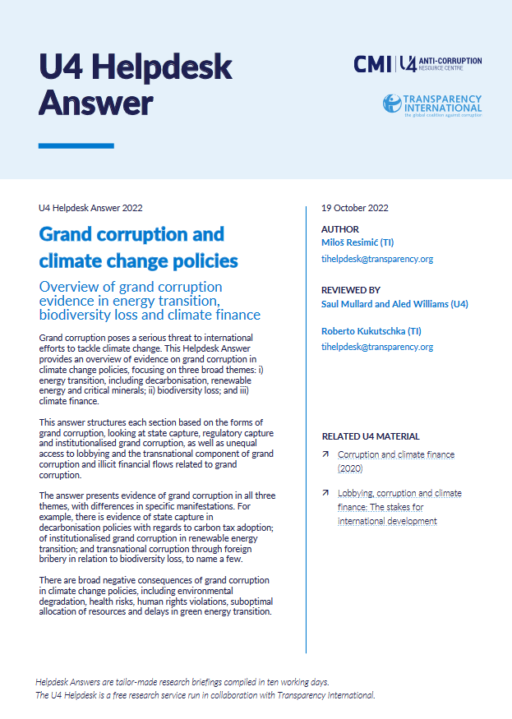- Home
- Anti-Corruption Helpdesk
- Grand corruption and climate change policies: Overview of grand corruption evidence in energy transition, biodiversity loss and climate finance
Grand corruption and climate change policies: Overview of grand corruption evidence in energy transition, biodiversity loss and climate finance

This Anti-Corruption Helpdesk brief was produced in response to a query from a U4 Partner Agency. The U4 Helpdesk is operated by Transparency International in collaboration with the U4 Anti-Corruption Resource Centre based at the Chr. Michelsen Institute.
Query
Please provide an overview of evidence on the links between grand and transnational corruption and international efforts to tackle climate change, with a focus on energy transition, biodiversity loss and climate finance.
Summary
Grand corruption poses a serious threat to international efforts to tackle climate change. This Helpdesk Answer provides an overview of evidence on grand corruption in climate change policies, focusing on three broad themes: i) energy transition, including decarbonisation, renewable energy and critical minerals; ii) biodiversity loss; and iii) climate finance.
This answer structures each section based on the forms of grand corruption, looking at state capture, regulatory capture and institutionalised grand corruption, as well as unequal access to lobbying and the transnational component of grand corruption and illicit financial flows related to grand corruption.
The answer presents evidence of grand corruption in all three themes, with differences in specific manifestations. For example, there is evidence of state capture in decarbonisation policies with regards to carbon tax adoption; of institutionalised grand corruption in renewable energy transition; and transnational corruption through foreign bribery in relation to biodiversity loss, to name a few.
There are broad negative consequences of grand corruption in climate change policies, including environmental degradation, health risks, human rights violations, suboptimal allocation of resources and delays in green energy transition.
Main points
- Grand corruption is present in all three themes discussed: energy transition, biodiversity loss and climate finance.
- The dominant forms of grand corruption in energy transition policies are unequal access to lobbying, institutionalised grand corruption and the transnational component of grand corruption, while in biodiversity loss and in climate finance the dominant forms are the transnational component of grand corruption and institutionalised grand corruption.
- Key actors involved in networks of grand corruption vary based on the theme, but mainly include political officeholders, multinational corporations, oversight and regulatory bodies, professional enablers, domestic firms.
- The negative consequences of grand corruption in climate change policies are numerous, including environmental degradation, health risks, human rights violations, suboptimal allocation of resources, and delays in green energy transition.
Contents
- Introduction
- Grand corruption in energy transition
- Decarbonisation
- Renewables
- Critical minerals
- Grand corruption in biodiversity loss
- Grand corruption in climate finance
- References
Authors
Miloš Resimić ([email protected])
Reviewers
Saul Mullard and Aled Williams (U4)
Roberto Kukutschka (TI)
Date
15/12/2022
Tags
 Download PDF
Download PDF
